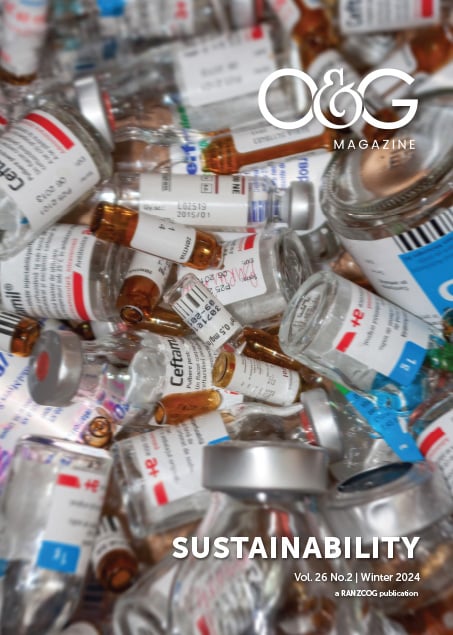The term sustainability is synonymous with the environment. It brings to mind how we live, work and travel, and a gnawing anxiety about future generations. As a baby boomer, I grew up without much thought for how the climate impacts the way we live, and now it is at the forefront of everything we do. Every week I face the dichotomy of repurposing and recycling at home, getting to work by electric vehicle, only to watch a large disposal bin fill with plastic after a day in the operating theatre.
Considering the high healthcare carbon footprint, what is our responsibility as clinicians and what is the role of the College? The challenge is to balance sometimes competing and overlapping objectives. Among RANZCOG’s strategic priorities1 we aim to ensure our organisation is sustainable. This commits us to “embed social and environmental sustainability practices to all the College operations”, but at the same time “to make considered decisions on all financial outlays, balancing the needs of the College against the members’ and trainees’ fees required to cover these costs”.
The increasing rate of natural disasters placing strain on health systems and hospitals was highlighted recently at the 15th Biennial Pacific Society of Reproductive Health (PSRH) conference in Auckland. We also heard about the burden of cancer for Pacific women and efforts towards cervical cancer elimination, as well as the lack of education and access to sexual and reproductive health care. I was reminded how crucial it is that RANZCOG continues to help sustain women’s health in the Pacific through educational scholarships and upskilling options in Australia and New Zealand through our longtime affiliation with PSRH.
We are aware of the threat to sustainability of O&G services and dependence on overseas trained specialists to address workforce gaps, particularly in Aotearoa New Zealand, and crucial to our subspecialties. The maternity care model in Aotearoa New Zealand is under scrutiny with an acute midwifery workforce shortage, and recognised burnout among obstetricians. RANZCOG will continue to advocate for the development of a women’s health strategy in Aotearoa New Zealand which is enshrined in health legislation but has not, as yet, had the attention it deserves. This is fundamental for predicting future workforce needs.
The closure of private maternity services in Australia, has often precipitated gaps in access to care in regional and rural areas. We have continued to advocate to the Commonwealth Government the importance of a thriving maternity service to sustain medical services in regional and rural areas. Reform is underway following the Kruk report2, streamlining accreditation “to fast track more cohorts from countries with similar regulatory systems”. RANZCOG has been selected by the Australian Medical Council, along with RACGP, ANZCA and RANZCP in the first tranche to adapting our current processes. The Council of Presidents of Medical Colleges (CPMC) is advocating strongly for colleges to remain involved in a future Specialist International Medical Graduate assessment pathways.
In March, RANZCOG hosted the third Women’s Health Summit in Canberra gathering stakeholders from across Australia. The Assistant Minister for Health and Aged Care Ged Kearney spoke about gender bias in health care, as well as sustaining a workforce in the regional, rural, and remote Australia. You may have seen National news coverage with RANZCOG Vice-President Nisha Khot recommending closing the gender gap with the Medicare Benefits Schedule in Australia, which delivers higher out of pocket costs for women compared to men in reproductive health care.
As doctors we come under the spotlight as contributors to healthcare carbon emissions with air travel for continuing professional development and educational purposes. Much of the College’s work is achieved thanks to a large voluntary member group and while most of this happens online, the value of in-person meetings shouldn’t be underestimated. This is particularly true for advocacy efforts with external stakeholders like the government. Given the volume of travel associated with the President’s role, I have committed to flying economy class between New Zealand and Australia as much as possible — more sustainable for the environment, not to mention the College budget!
I hope you enjoy this winter issue of O&G Magazine focused on sustainability in obstetrics and gynaecology.






Leave a Reply